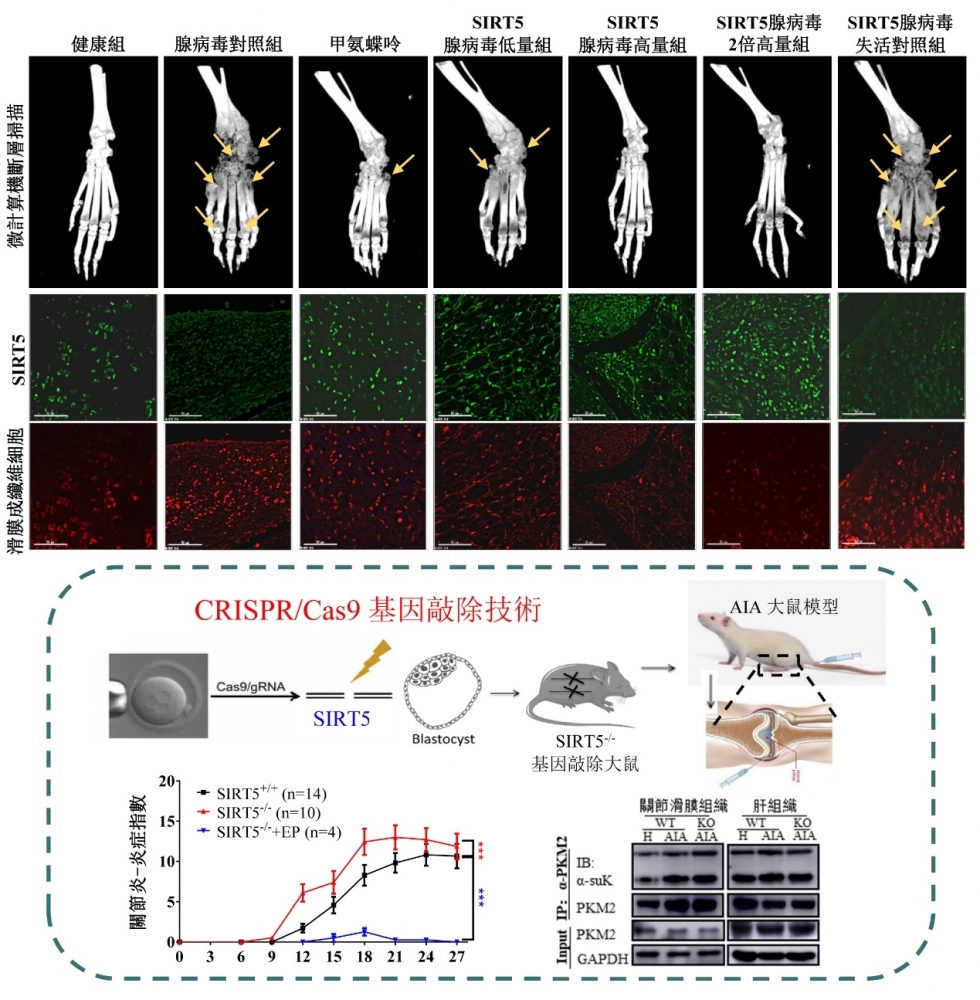Rheumatoid arthritis (RA) is a worldwide autoimmune disease which is related to the immune-dysfunction of the body, and its disease pathogenesis remains unknown. In recent years, the study of genes regulation in precision mechanism and therapeutic target of RA are the key focus of research in the international field.
The research team led by Chair Professor Liu Liang, academician of the Chinese Academy of Engineering and president of the Macau University of Science and Technology (M.U.S.T.), has recently found that the gene expression level of desuccinylase sirtuin 5 (SIRT5) was significantly reduced in the blood of patients with RA compared to healthy volunteers, suggesting the pathogenic role of SIRT5 in RA. To verify this new discovery, the research team conducted a series of comprehensive animal experiments: (1) Establishment of the adjuvant induced arthritis (AIA) rat model which confirmed that the level of SIRT5 in the blood serum of AIA rat was significantly lower than healthy control, and was consistent with the serum detection results from patients with RA. (2) Innovative construction of AIA rat models with adenovirus-SIRT5 injection in the articular cavities showed that, overexpression of SIRT5 could significantly reduce the pathological degree of RA. (3) Generation of the first SIRT5-deficient AIA rat model using CRISPR/Cas9 technology. The results showed that the inflammatory condition of SIRT5-/- knockout AIA rats was significantly worse than that in SIRT5 wild-type rat. Collectively, both of the above clinical and experimental data unraveled the low expression of SIRT5 could potentiate the pathogenesis and development of RA. To further confirm the pathogenic role of SIRT5 in RA, the research team has implicated the role of immunemetabolism in RA by affirming the level of SIRT5 in AIA rats was inversely proportional to the number of monocytes/macrophages in blood and the number of synovial fibroblasts in joints of rats, and the supplement of ethyl pyruvate, a product of glucose metabolism could alleviate the joint swelling of SIRT5-/- AIA rats (Figure 1). This work has opened up a new path for the development of novel target drugs for precision treatment of RA.
The current study adopted rigorous experimental design and cutting-edge technology to clarify the clinical problem, revealed the new pathogenic mechanism of RA, and explored the new therapeutic strategies of RA by activation of SIRT5 or promotion of glucose metabolism. This research work was recently published in the journal of “Cellular & Molecular Immunology” (Most recent impact Factor in 2018:8.2; https://doi.org/10.1038/s41423-020-0380-4). Prof. Liu Liang (chair professor of Macau University of Science and Technology), and Dr. Vincent Kam Wai Wong (associate professor of State Key Laboratory of Quality Research in Chinese Medicine) are the corresponding author and co-corresponding author respectively. Miss Ni Zhang (PhD student) is the first author. Guangdong Hospital of Traditional Chinese Medicine, The Third Affiliated Hospital of Soochow University, First Teaching Hospital of Tianjin University of Traditional Chinese Medicine and Guangzhou Hospital of Integrated Traditional Chinese and Western Medicine provided clinical samples for this study. This research project was supported by Macao Science and Technology Development Fund (FDCT project code: 0003/2019/AKP & 0048/2018/A2).

SIRT5 deficiency enhanced the inflammatory condition in AIA rats





